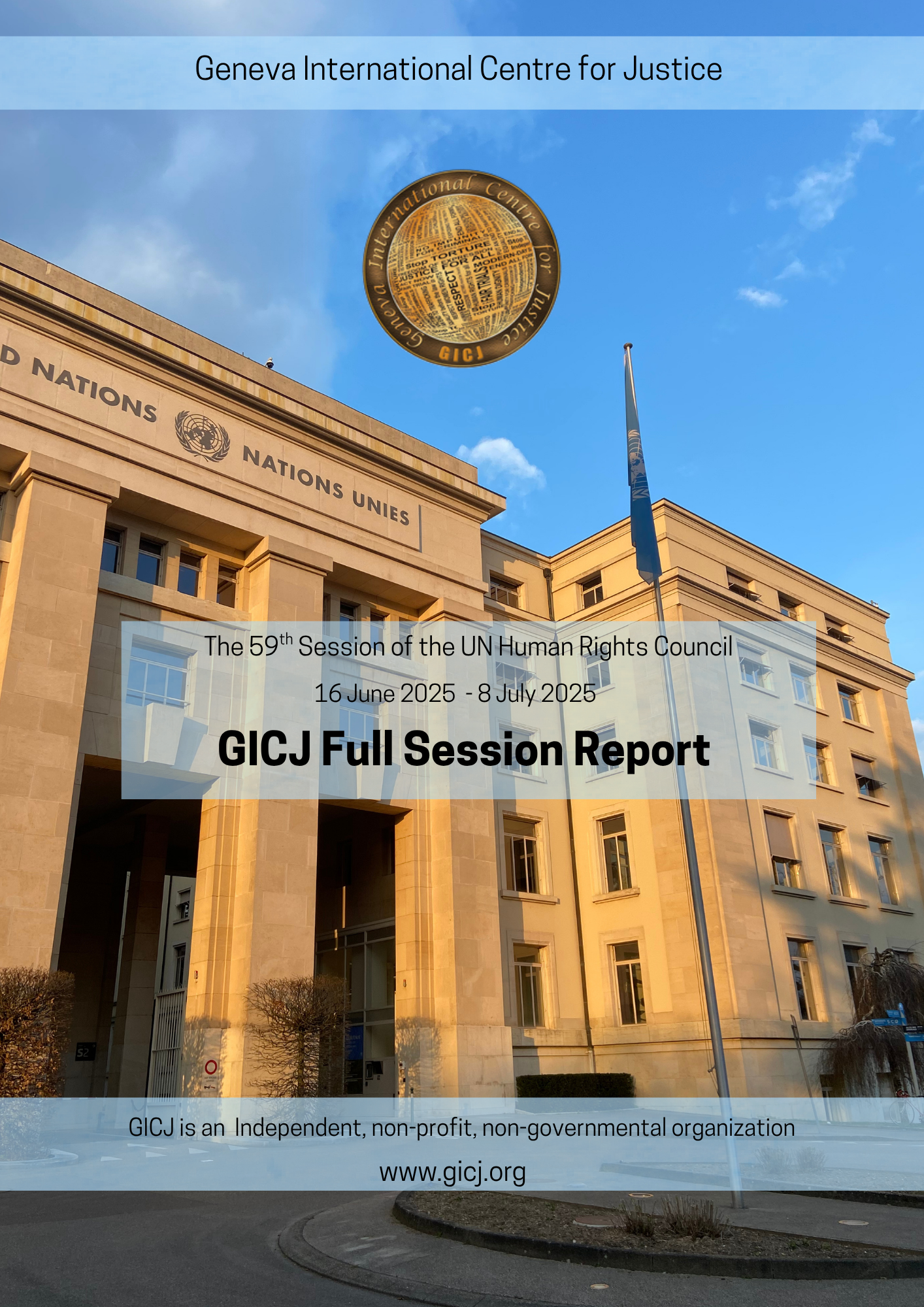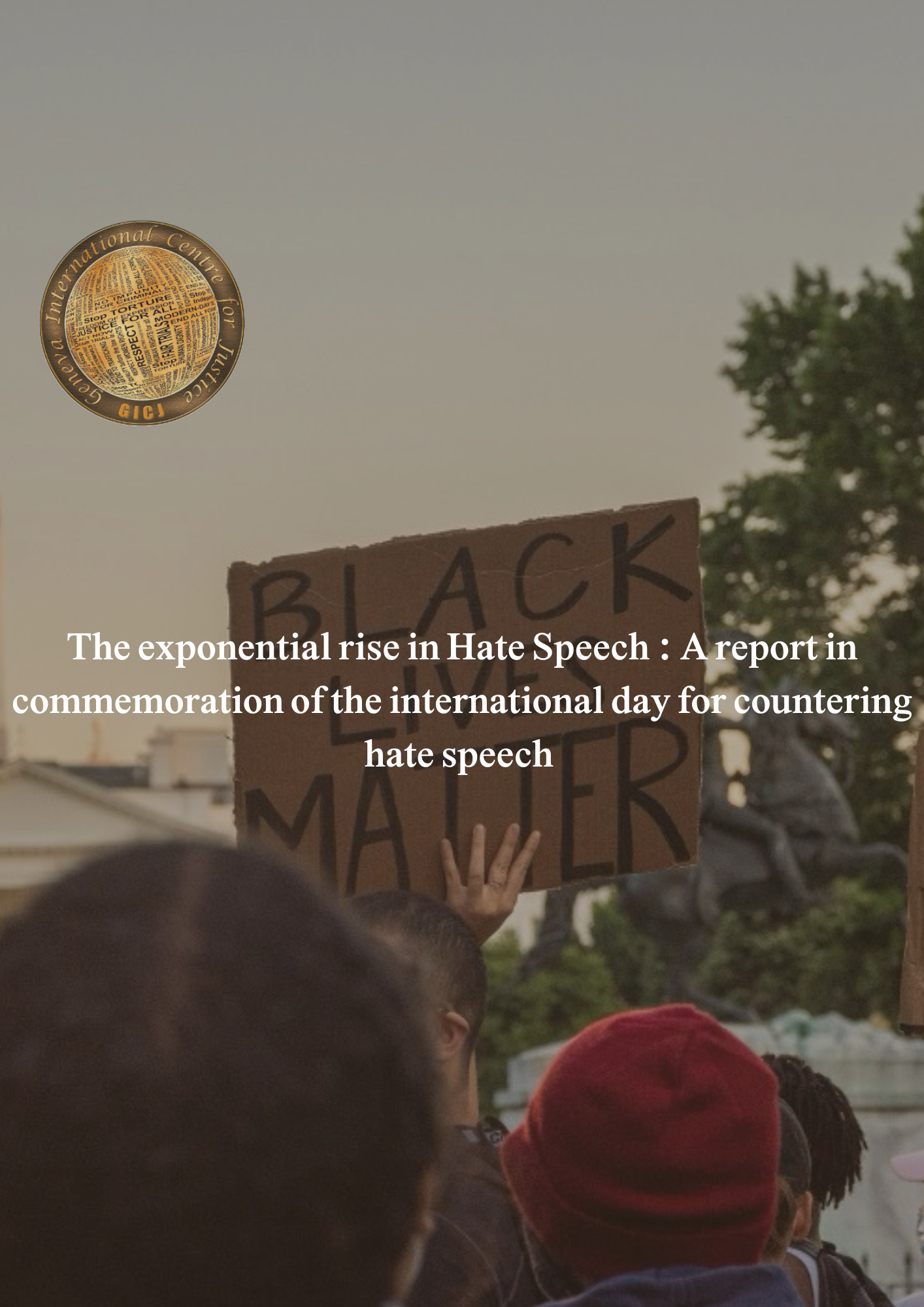The 52nd Session of the Human Rights Council
27 February – 4 April 2023
Annual Full-Day Meeting on the Rights of the Child
10 March 2023
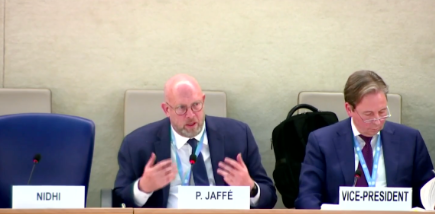
By Kiyana Newell / GICJ
Executive Summary
“We know that this rapid progress in technology doesn’t come without risks…” said the High Commissioner of Human Rights.
On March 10th 2023, during the Annual full-day meeting on the Rights of the Child, Panellists such as Mr. Philip Jaffé, and delegates discussed obstacles to protecting children’s rights in the digital environment. For the first time in history, children like Marina and Nidhi were able to speak about their experiences as a child in the digital environment. As panellists at the Human Rights Council, they addressed member states and the High Commissioner alike about their concerns and asked what efforts are being made to circumvent harms they may experience as well as the lack of internet access they and their peers’ face .
In this digital age, children are more connected than ever before. But with new opportunities to express themselves online, there are risks that expose children to harassment, exploitation, breaches of privacy, addiction, and bullying among other harms. Another challenge children face is access to technology such as computers, phones, and tablets, especially in lesser developed countries. Access is necessary for children's ability to receive information and a good education.
Geneva International Centre for Justice (GICJ) welcomes the opportunities made for children in the digital environment. Additionally, we welcome the interest and commitment to children’s safety in the digital environment of the Human Rights Council, specifically for not allowing videos or pictures to be taken of the children panellist during the full-day meeting. However, we are concerned about the trajectory of the digital environment regarding the rights of children and the increasing digital divide. Due to these new challenges posed by the internet, we call on member states to create and implement policy changes to regulate the harms experienced by children.
Background
The Annual Full-day meeting of the Rights of the Child was nominated by the Human Rights Council Resolution 49/20. The United Nations Convention on the Rights of the Child was adopted in 1989 in an effort to recognise and protect every child as rights holders. As children are more connected to the digital environment than ever before, they are exposed to harassment and exploitation, among other harms within cyberspace.
The Committee on the Rights of the Child established General Comment Number 25 (CRC/C/GC/25) in 2021 relating to children’s rights in the digital environment. The creation of the document included member states, international organisations, civil society, 700 children and young people. The General Comment acknowledges how technology can amplify children's voices and can create opportunity. Policies and laws regarding the digital space that are created must incorporate the best interests of the child.
High Commissioner’s Report on the Right to Privacy in the Digital Age
Pursuant to the Human Rights Council Res. 42/15, The High Commissioner for Human Rights reported on states and businesses’ widespread use of artificial intelligence (AI) and other machine learning technologies that affect the right to privacy. Since children are part of the digital environment in which businesses and states violate their privacy using these technologies, the right to privacy is interconnected with child's rights concerning cyberspace.
The Right to Privacy involves the protection of a person's autonomy and personal identity, including children. The report illustrates that the operation of AI systems relies, although not exclusively, on large personal data collection and the processing of that data. Data breaches also occur in businesses and states that expose the sensitive information of millions of people to unknown parties.
The report highlights four key ways in which states and businesses violate the right to privacy. First, the usage of AI in law enforcement by states. Law enforcement use these technologies as forecasting tools, biometric recognition, and deducing someone's emotional state. All of these are used by the State to intervene and make decisions. Second, is the use of AI systems in public services. Even though these technologies are used to send more accurate deployment of services the report mentions that this could have adverse effects if proper safeguards are not in place.
Thirdly, AI systems in the workplace are used to monitor and manage employees and to gather more efficient information on them. This impacts decisions related to hiring and dismissals. Lastly listed in the report, is the use of social media platforms using AI systems to decide what content to amplify and demote based on personal data.
Apprehensions about the use of these technologies are valid, particularly regarding the breaching of children’s privacy. There must be data privacy frameworks and legislation made to ensure the protection of a child’s identity.
Panellist Speakers
Child panellist, Ms. Mariana, a human rights Defender, from Colombia, introduced herself by saying that she is an African Descendant girl living in a rural area in the south of Colombia where the communities there are trying to better their life even though there are armed groups who frighten the community. A lot of children in the village are studying but most children do not have access to technology that would allow them to gain information. She claimed that it is very hard for families to buy tablets and phones hence why during the Covid-19 pandemic children were unable to learn online.
There is a lot of digital inequality in Colombia stated the panellist. In larger cities, 70 percent of families have internet access and in rural areas, it is only 29 percent. In her village, there are public libraries and families have to travel through dangerous areas to the Municipality to reach a public library where they could possibly have access to the internet or computers.
Ms. Mariana believes that decision-makers in her country should pay more attention to the Rights of the Child in the digital environment and prioritise education regarding access to computers and the internet for each pupil. Also, children need more training in using technology because they are often exposed to pornography, bullying, and sexual harassment. Ms. Mariana called on her country and the international community to be fully committed to resolving these issues and to create policies that ensure diversity and inclusion.
''How do we know the information we provide is being kept safe?” stated, child panellist, Ms. Nidhi, youth advocate, author and podcaster, from India. She emphasised, in her opening statement, the importance of data protection for children, especially since she noted that children do anything and everything on the internet. One in three online users globally are children, which is unsafe because most children do not know how to protect their data, she claims. A statistic she provided that is extremely alarming, is that 72 million pieces of personal data will be collected by a child's 13th birthday. Notably, digital applications collect information, including but not limited to, the location of the user and likes and dislikes. But in actuality, the purposes for which they collect go beyond just promotion.
Ms. Nidhi believes that the use of this data collection is largely unethical and a violation of children’s rights because children lack the capability to understand “what they are signing up for''. A great example she provided is how ‘Terms and Conditions’ make it possible for businesses to do what they want with personal data in exchange for the usage of the digital application. It is almost as if the Terms and Conditions are bogged down with legal jargon to make the document unreadable or discourage users from reading it.
“Just think about it, If even adults can’t read through these how is it children are expected to?”
Ms. Nidhi concluded her statement by asking the High Commissioner of Human Rights how can underprivileged children with no experience of the online world trust companies to protect their data, what policies are in place for this, and how will companies be dealt with when data is collected from children.
Mr. Philip Jaffé, a member of the Committee of the Rights of the Child and Director of the Centre for Children’s Rights at the University of Geneva, remarked that the Committee of the Right to a Child established General Comment Number 25 to ensure children's rights were provided in the committee regarding the digital environment. In his statement, he emphasised that the world cannot envision a future without the full authentic participation of children. Children can express valuable opinions and should be listened to in policies and situations that pertain to them.
Interactive Dialogue
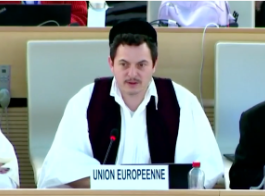 The Delegates of the European Union said that they understood the risks children face in this digital age due to having internet access at a young age. That is why they are strengthening and updating their legal frameworks regarding the internet. They are adopting a new strategy for better internet services for kids. The process of this framework includes consultation with children, their parents, teachers, member states, academics, NGOs, and civil society. The delegate also asked the child panellists for their advice on what is the barrier between protection and opportunity.
The Delegates of the European Union said that they understood the risks children face in this digital age due to having internet access at a young age. That is why they are strengthening and updating their legal frameworks regarding the internet. They are adopting a new strategy for better internet services for kids. The process of this framework includes consultation with children, their parents, teachers, member states, academics, NGOs, and civil society. The delegate also asked the child panellists for their advice on what is the barrier between protection and opportunity.
The Mexican delegation remarked that they hope the exchange of ideas will highlight the 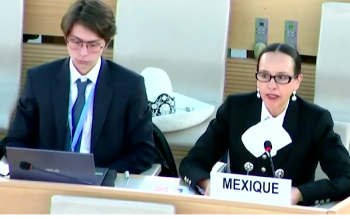 opportunities and risks entailed in the digital environment. In Mexico’s constitution, it is recognised as a right for all persons, including children, to have access to information technologies. These technologies allow communication and interaction from around the world, especially for those children living in poverty. The delegate stated that they want to narrow the digital divide for children.
opportunities and risks entailed in the digital environment. In Mexico’s constitution, it is recognised as a right for all persons, including children, to have access to information technologies. These technologies allow communication and interaction from around the world, especially for those children living in poverty. The delegate stated that they want to narrow the digital divide for children.
The representative of Luxemburg, a child herself, acknowledged how children are making new friends and learning new cultures in the digital environment. She explained that she is disheartened by the bullying in elementary and high schools. Children are experiencing false rumours and even threats on the internet. She called on lawmakers and government officials to hold media groups accountable for their lack of commitment to regulating platforms. Schools should introduce awareness campaigns and bullies should face consequences for their actions.
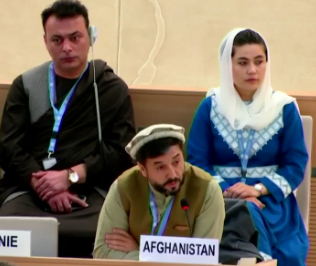 The delegate from Afghanistan was emotionally moved by the opening remarks of the child panellists. While listening to their experiences and concerns he thought of the millions of Afghanchildren who are deprived of an education. He believes that education for the children in the global south means having hope and a future. March 21st is when schools open up in Afghanistan but 6 million children, mostly girls, will not be able to attend this upcoming school year, he noted.
The delegate from Afghanistan was emotionally moved by the opening remarks of the child panellists. While listening to their experiences and concerns he thought of the millions of Afghanchildren who are deprived of an education. He believes that education for the children in the global south means having hope and a future. March 21st is when schools open up in Afghanistan but 6 million children, mostly girls, will not be able to attend this upcoming school year, he noted.
As he “went off script” the delegate gave up the rest of his time to speak so the audience can take time to think about the girls banned from going to school and also think about what digital technology can do to address this situation.
The delegate from Bolivia commended the opening remarks from the panellists especially, Ms. Mariana and Ms. Nidhi, and recognised their activism in defending children’s rights. The Bolivian people believe in the right to education for children. The delegate further believes that the right to education must incorporate access to technology and acknowledge it as a tool for empowerment.
Mariana and Ms. Nidhi, and recognised their activism in defending children’s rights. The Bolivian people believe in the right to education for children. The delegate further believes that the right to education must incorporate access to technology and acknowledge it as a tool for empowerment.
The government is working on closing the gap between citizens and technology so that they can bring technology closer to children. Bolivia has been working on a number of initiatives and policies to close the digital divide in the country. The government has a portal, which can be accessed offline, that contains educational content and they are creating virtual learning for students. They also have a program to train teachers through technological and digital courses.
Concluding Remarks
Mr. Philip Jaffé, thanked all the state representatives and organisation representatives for their commitment and interest in children's rights in the digital environment. He gave special thanks to the Council for not only committing a full day for discussing children’s rights but also having children present in person. He has heard that technologies and the digital environment have both dark and positive elements. To focus on the positive elements, he continued by saying that children are demonstrating creativity and new ways of thinking and the international community should harness this positivity not only with education but by giving them a little supervision as they experiment.
Mr. Philip Jaffé hopes that the international community creates regulatory policies and keeps in mind that children change over time.
Position of the Geneva International Centre for Justice (GICJ)
Geneva International Centre for Justice (GICJ) commends the efforts made by member states and the international community, especially for not allowing pictures or videos to be taken of the child panellist and for letting them speak at the full-day meeting. This shows the Council’s commitment to their safety and their right to expression. It is important for children to express their experiences and discuss issues affecting them. However, we also share the same concerns about businesses and states gaining access to children's personal information as well as the increasing harassment and bullying online.
We call on member states to regulate the digital environment regarding the personal data collection of children and to promote an environment online where children can be free from harassment but also take advantage of online opportunities . It is vital for children to have access to education and through that access to technologies to gain information is imperative.
#RightsoftheChild #DigitalEnvironment #HRC52 #HumanRights #HumanRightsCouncil #Geneva4Justice #GenevaInternationalCentreforJustice #GICJ








